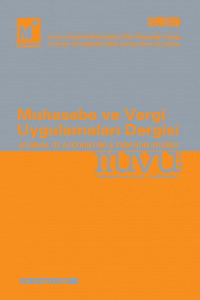PREDICTION OF CORPORATE GOVERNANCE-PERFORMANCE RELATIONSHIP WITH A DYNAMIC MODEL
The objective of this study is to examine whether there is a relationship between the performances and corporate governance levels of companies traded in corporate governance index between 2007 and 2015 in Turkey, which is an emerging market. Different from the previous studies conducted in Turkey, the analysis is conducted with a dynamic method, the System Generalized Moments Method (system GMM). Furthermore, the analysis covered a long sampling period from the date when corporate governance is started to be calculated until today (2007 – 2015). Analysis results demonstrated that there is a positive and statistically significant relationship between corporate governance scores and accounting-based ROA and market-based Tobin’s Q ratios.
Anahtar Kelimeler:
Corporate Governance, Firm Performance, Dynamic Panel Data Analysis, System GMM
KURUMSAL YÖNETİM - FİRMA PERFORMANSI İLİŞKİSİNİN DİNAMİK BİR MODELLE TAHMİNİ
Bu çalışmanın amacı gelişmekte olan bir ülke olan Türkiye’de, 2007-2015 yılları arasında kurumsal yönetim endeksinde işlem gören firmaların performansları ile kurumsal yönetim düzeyleri arasında ilişki olup olmadığının incelenmesidir. Analiz Türkiye’de yapılan diğer çalışmalardan farklı olarak dinamik bir method olan Sistem Genelleştirilmiş Momentler Metodu (sistem GMM) kullanılarak yapılmıştır. Ayrıca analiz kurumsal yönetimin hesaplanmaya başladığı yıldan günümüze kadar (2007-2015) geniş bir örneklem dönemini kapsamaktadır. Analiz sonucunda, kurumsal yönetim notları ile muhasebe temelli ROA ve piyasa temelli Tobin’s Q performans oranları arasında istatistiksel olarak pozitif ve anlamlı bir ilişki olduğu sonucuna ulaşılmıştır.
___
- Ararat, M., Orbay, H. (2006). Corporate governance in turkey; implications
- for investments and growth. Backround Paper for Turkey’s Investment
- Climate Assessment, 1-49
- Bai, C., Liu, Q., Lu, J., Song F., Zhang, J., (2004). Corporate governance and
- market valuations in China. Journal of Comparative Economics, 32, 599-
- 616.
- Black, B. (2001). The corporate governance behavior and market value of
- Russian firms. Emerging Markets Review, 2, 89-108.
- CIPE-Center For International Private Enterprise. (2008). Corporate
- governance for emerging markets.
- Ege, İ., Topaloğlu, E., Özyamanoğlu M. (2013). Finansal performans ile
- kurumsal yönetim notları arasındaki ilişki: BIST üzerine bir uygulama,
- Journal of Academic Researches and Studies, (5-9), 100-117.
- Eminoğlu, C. (2014). Türk Ticaret Kanunu’nda kurumsal yönetim. XII Levha.
- İstanbul.
- G20/OECD. (2015). Kurumsal yönetim ilkeleri. 1-62.
- Gompers, P., Ishii, J., Metrick, A. (2003). Corporate governance and equity
- prices. Quarterly Journal of Economics, 118, 107-155.
- Morey, M., Gottesman, A., Baker, E., Godridge, B. (2009). Does better
- corporate governance result in higher valuations in emerging markets?
- Another examination using a new data set. Journal of Banking & Finance,
- 33, 254-262.
- Munisi, G., Randoy, T. (2013). Corporate governance and company
- performance across Sub-Saharan African countries. Journal of Economics
- and Business, 70, 92-110.
- Nguyen, T., Locke, S., Reddy K. (2014). A dynamic estimation of governance
- structures and financial performance for Singaporean companies.
- Economic Modelling, 40, 1-11.
- Shleifer, A., Vishny R. (1997). A survey of corporate governance. The
- Journal of Finance, 52, 737-783.
- Singh, A. (2003). Corporate governance, corporate finance and stock
- markets in emerging countries. Journal of Corporate Law Studies, (3-1),
- 41-72.
- SPK. (2003). Kurumsal Yönetim İlkeleri.
- Tatoğlu, F. (2013). İleri Panel Veri Analizi. Beta Yayıncılık. İstanbul.
- Yenice, S., Dölen, T. (2013). İMKB’de işlem gören firmaların kurumsal
- yönetim ilkelerine uyumunun firma değeri üzerindeki etkisi. Uluslararası
- Yönetim İktisat ve İşletme Dergisi, (9-19), 199-214.
- Zagorchev, A., Gao L. (2015). Corporate governance and performance of
- financial institutions. Journal of Economics and Business, 82, 17-41.
- ISSN: 1308-3740
- Yayın Aralığı: Yılda 2 Sayı
- Başlangıç: 2008
- Yayıncı: Ankara Serbest Muhasebeci Mali Müşavirler Odası
Sayıdaki Diğer Makaleler
DAİMİ İŞYERİ STATÜSÜNDEN KAÇINMAYI ÖNLEMEDE YENİ ULUSLARARASI YAKLAŞIM
İbrahim ORGAN, Mustafa Cemil KARA
PREDICTION OF CORPORATE GOVERNANCE-PERFORMANCE RELATIONSHIP WITH A DYNAMIC MODEL
TAZMİNAT KAVRAMI VE TMS 37 KAPSAMINDA TAZMİNAT VARLIKLARININ SİGORTA ŞİRKETLERİNDE RAPORLANMASI
Selahattin KARABINAR, Şuayyip Doğuş DEMİRCİ
